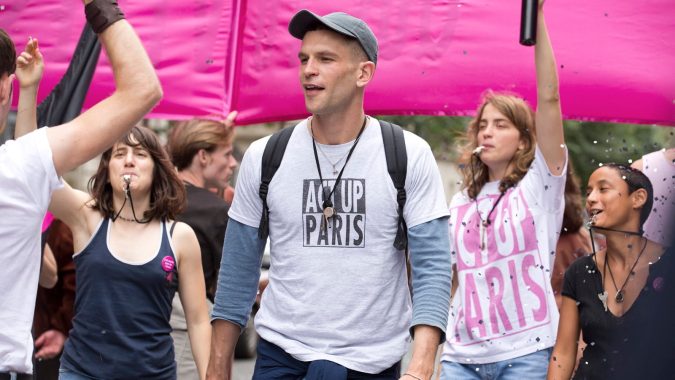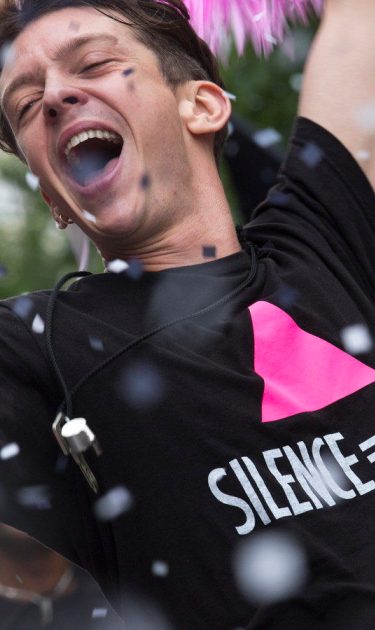Throwing fake blood at a high-ranking member of the pharmaceutical industry might seem extreme by today’s tamer protesting standards, but back in the 1990s at the peak of the AIDS epidemic – as people were fighting for their very lives – playing nice was simply not enough. Director Robert Campillo’s drama BPM (Beats Per Minute) centers on the Paris chapter of ACT UP, an HIV/AIDS advocacy group that worked to create awareness at a time when invisibility was the norm. The film, which won the Grand Prix (essentially the runner-up award) at Cannes this year, is influenced by Campillo’s own experiences as an ACT UP militant.
Although propelled by an ensemble cast of marvelous young talents, the heart of Beats Per Minute is undoubtedly Argentine actor, Nahuel Peréz Biscayart, who plays Sean, a cheeky and resolute man who got infected with HIV at a young age, but lives intensely and purposefully. There is rage and courage in all of his actions, and above all a decisive conviction that whatever time he has left will be used to make the world pay attention by any means necessary. Sean dances, kisses, caresses, fights, screams, and loves without reservations. Infused by Campillo’s first-hand recollections, archival content, the group dynamic, and the task of losing 15 pounds in a matter of days, Nahuel crafts an electrifying performance.
Death is an inherent villain in this story, but rather than letting sentimentality take over, Beats Per Minute is a vibrant portrait of resilience. Ethereal cinematography captures dancing sequences as if they were luminous dreamscapes, and uses them as transitions into intimate scenes. It’s these moments that vulnerability shines visually. During the rest of the film, the camera is an active member of the action and forces the viewers to be immersed in the cause. Nahuel describes Sean’s personality as “pura vida,” a saying that also perfectly describes the movie as whole.
Nahuel Peréz Biscayart got real with Remezcla about online-only activism, the lack of empathy that plagues the world, and finding strength in even the direst circumstances.
BPM is currently in theaters.
On His Character Living and Dying in a Political Way
Sean was condemned by the disease and doubly condemned because of the place that society assigned him at the time as a gay man. What makes him a political character is his ability to synthesize that death sentence into a powerful force. What’s political about him is that he is able to transform an intimate situation into something public. In the film, he doesn’t talk about his life. I, Nahuel, don’t know about his life. I have no idea about what he does or where he works. He takes on the role, embodies it, and that’s why when they ask him, “What do you do in life?” He says, “I’m HIV-positive, my life is reduced to that.” There is no other way for him to live that is not assuming his condition and using it as a weapon in battle. Everything about him is political. His life, his body, and his soul have been given up for the fight, and that’s why he decides to die and for his ashes to also become a political act. He disappears in the collective, and it’s also thanks to that that he is able to live so intensely. He could have been depressed and died in a corner or a basement, just like society likely wanted him to die: vanished, ignored, and forgotten. He does exactly the opposite. He converts that sentence into presence and visibility.
On How Protesting Has Changed From the Days of the AIDS Crisis to Today
We have the Internet and social networks as a new way to interact. The virtual world has taken over the means of communication between human beings in a clear way. That allows us to have a more direct connection with people who are not physically next to us, which we could consider as a possibility to build more relationships and making stronger networks. But on the other hand it also functions as a tool for isolation in which one can show himself or construct a personality that is not really what one is in daily life. You can be absolutely radical on social media, and in real life have a complacent bourgeois life. We probably do it because it makes us feel better in regards to how committed we are. We are at a moment in which technology is crushing us and it has become the opium of the masses. Before it was religion, now it’s money and social networks. Looking back at history the only political changes that ever happened always came from people taking to the streets, people on the streets creating situations of instability. If there is nothing at risk, change is not possible.
On Empathy and the Faith of the Human Race if We Don’t Change Our Worldview
Nobody is going to change because he empathizes with the other. Nowadays human beings don’t put themselves in another person’s place. No way. That’s the great conflict. And since we are unable to put ourselves in another person’s place, there is no possibility for understanding and for the social structures to change. The one that’s doing well wants to continue doing well, and wants to be even better. The one that’s doing badly admires the one who is doing better and if he can crush the one who is worst in order to be better off, he will do it. We are all in a desperate race to survive each on our own, and we don’t realize we share the same air, the same water, and if we don’t do anything with what we have and learn to share it, we are all heading straight for condemnation. That’s likely what’s going to happen. If human beings don’t change their conception of the world in an existential way, we are going to disappear, which is actually the best thing that could happen to the planet. We are a cancerous species to this planet.

On Why People Are Happy to Share on Social Media But Won’t Go Out to Protest
When there is not an intimate relationship with that suffering the reaction one has is much less immediate. There are always catalysts. There are elements that awaken certain fights and that turn them into something concrete. Unless the issue touches us in an intimate manner, of course, we are not going to react. If you turn the faucet on and you still have drinking water, you are not going to go out and fight for those who don’t have it. There are very few people in the world that are able to put themselves in another person’s shoes and make the other person’s cause their own battle. Those are the indispensable people in the world, like Che Guevara and many others. They have unfortunately ended up being murdered by the reigning power that wants to reproduce the society in which we live, which in turn guarantees extreme accumulation of wealth for a segment of society and hunger and poverty for the vast majority of people.
On What He Learned from Playing Sean in BPM (Beats Per Minute)
“He could have been depressed and died in a corner or a basement, just like society likely wanted him to die: vanished, ignored, and forgotten. He does exactly the opposite.”
It’s difficult to put a learning experience into words. I experienced. I had an experience with my body and my emotions that allowed me to put myself in another person’s skin, which is essentially what actors do, and it certainly trained my empathy. It got me closer to how those characters felt and the courage they had. It probably also reconciled me with mankind as a species when I get to have access to those very strong and courageous personalities like them. It pushes you to keep on living and be closer to those entities, value them, and to try to learn and reproduce their best qualities. For example, the strength of being in a group, the idea that when we do things among many they are going to be better than when we do them in isolation and only for own benefit. When we are many we are better.
On How He Ended Up Working in the French Film Industry
It was an accident. There was an Argentine film that opened theatrically in France called La sangre brota, and was seen by a French director who was looking for a foreign actor that could speak a dialect with a particular accent and he offered me the part. At the time I was living in Argentina and I went to do that movie in France. Then I made films in other countries for about four years. I lived in New York for a year working with a theater group. My life started expanding around the world but not necessarily settling down in France. The fact that it now seems like I’m a French actor is simply because last year I acted in three French movies – that’s it. Next year I’m not sure where I’ll be. I don’t know if I’ll still be working in France or if I’ll go work in Romania. I have no idea. Working in France happened very naturally. I learned the language about six year ago, not because I wanted to develop a career in France, but because I had learned English easily and I wanted to learn another language. I thought it was interesting to be able to acquire another tool for communication, and in the end it also helped me act in French films.
On People Living with HIV Today
Today having HIV is not a death sentence for those who have access to medication. Those who don’t have access to medication either because it’s not free and they don’t have the means to buy them or because they live in remote places of the world where there is no physical access to the medication; those people are still sentenced to death. Let’s not forget that. It’s a different thing to talk about Western countries or countries with certain economic status that allows people to buy the medication or get them from the state free of charge. Of course, we need to get tested more often and try to diagnose people because that’s the only way to start a therapy that can help these people become undetectable and so they can transmit the virus. On the other hand we also have to keep on working on breaking the social stigma that HIV-positive people still suffer. Nowadays, even if it seems like everything is fine, no one walks around with a t-shirt that says I’m HIV-positive. It’s not the same being it than not being it. If you are HIV-positive you don’t have the same possibilities of employment. The social stigma is still there. We already know how pharmaceutical companies are. The vast majority are business that don’t want to eradicate the problems but just fight the symptoms, which guarantees their eternal economic life.




